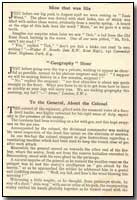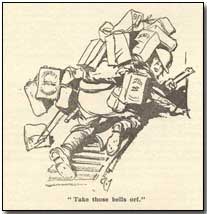Memoirs & Diaries - The Best 500 Cockney War Stories - To the General, About the Colonel and Other Stories
 Published in London
in 1921, The Best 500 Cockney War Stories
comprised, in the words of its newspaper publisher (The London Evening
News) "a remembering and retelling of those war days when laughter
sometimes saved men's reason".
Published in London
in 1921, The Best 500 Cockney War Stories
comprised, in the words of its newspaper publisher (The London Evening
News) "a remembering and retelling of those war days when laughter
sometimes saved men's reason".
The collection of short memoirs, some 500 in total, is divided into five categories - Action, Lull, Hospital, High Seas and Here and There. This page contains five stories from Lull, led by To the General, About the Colonel.
Other sections within the collection can be accessed using the sidebar to the right.
To the General, About the Colonel
The colonel of the regiment, gifted with the resonant voice of a daredevil leader, was highly esteemed for his rigid sense of duty, especially in the presence of the enemy.
The Germans had been troubling us a lot with gas, and this kept everyone on the qui vive.
Accompanied by the colonel, the divisional commander was making his usual inspection of the front line intent on the alertness of sentries.
In one fire-bay the colonel stopped to give instructions regarding a ventilating machine which had been used to keep the trench clear of gas after each attack.
Meanwhile the general moved on towards the other end of the fire-bay, where the sentry, fresh out from the reserve battalion recruited in Bermondsey, stood with his eyes glued to the periscope.
A natural impulse of the general as he noticed the weather-vane on the parapet was to test the sentry's intelligence on "gas attack by the enemy," so as he approached the soldier he addressed him in a genial and confiding manner: "Well, my lad, and how's the wind blowing this morning?"
Welcoming a little respite, as he thought, from periscope strain, by way of a short "chin-wag" with one or other of his pals, the unsuspecting sentry rubbed his hands gleefully together as he turned round with the reply: "'Taint 'arf so dusty arter all."
Then, suddenly through the corner of his eye he caught sight of his colonel at the other end of the fire-bay.
His face instantly changed its cheerful aspect as he breathlessly whispered to his inquirer, "Lumme, the ole man! 'Ere, mate, buzz orf quick - a-a-an' don't let 'im cop yer a-talkin' to the sentry on dooty, or Jerry's barrage will be a wash-aht when the Big Noise starts 'is fireworks!"
William St. John Spencer (late East Surrey Regiment), "Roydsmoor," Arneson Road, East Molesey, Surrey
Bow Bells - 1917 Style
We were going up the line at Bullecourt in April 1917.
I have rather bad eyesight and my glasses had been smashed. Being the last of the file I lost touch with the others and had no idea where I was. However, I stumbled on, and eventually reached the front line.
Upon the ground were some empty petrol cans tied up ready to be taken down to be filled with water. I tripped up amongst these and created an awful din, whereupon an angry voice came from out the gloom.
"I don't know 'oo or wot the dickens you are, but for 'eaven's sake take those bells orf!"
W. G. Root (late 12th London Regt.), 24 Harrington Square, N.W.1
"The Awfentic Gramerphone!"
This happened on that wicked March 21, 1918.
During a lull in the scrapping, a lone German wandered too near, and we collared him. He was handed over to Alf, our Cockney cookie. Things got blacker for us. We could see Germans strung out in front of us and on both flanks - Germans and machine guns everywhere.
"Well, boys," said our major, "looks as if it's all up with us, doesn't it?"
"There's this abaht it, sir," said Alf, pointing to his prisoner; "when it comes to chuckin' our 'ands in, we've got the awfentic gramerphone to yell 'Kamerad!' - ain't we?"
C. Vanon, 33 Frederick Street, W.C.1
The Muffin Man
Two companies of a London regiment were relieving each other on a quiet part of the line, late in the evening of a dismal sort of day. The members of the ingoing company were carrying sheets of corrugated iron on their heads for the purpose of strengthening their position.
A member of the outgoing company, observing a pal of his with one of these sheets on his head, bawled out: "'Ullo, 'Arry, what'cher doing of?" to which came the laconic reply: "Selling muffins, but I've lost me blinkin' bell."
H. O. Harries, 85 Seymour Road, Harringay, N.8
The Holiday Resort
Early in October 1915 a half company of the 3rd Middlesex Regiment occupied a front-line sector at Givenchy, known as the "Duck's Bill," which ran into the German line.
In spite of our proximity to the enemy our chief annoyance was occasional sniping, machine gunning, rifle grenades, and liquid fire, for the area had been given over mainly to mining and counter-mining.
It was expected that the "Duck's Bill" would "go up" at any moment, so it was decided to leave only one officer in charge, with instructions to keep every available man engaged either in furiously tunnelling towards the enemy to counter their efforts, or in repairing our breastworks, which had been seriously damaged in a German attack.
My men worked like Trojans on a most tiring, muddy, and gruesome task.
At last we were relieved by the Leicestershire Regiment, and one of my men, on being asked by his Leicester relief what the place was like, replied: "Well, 'ow d'yer spend yer 'olidies, in the country or at the seaside? 'Cos yer gits both 'ere as yer pleases: rabbit 'unting (pointing to the tunnelling process) and sand castle building (indicating the breast-work repairs), wiv fireworks in the evening."
The Leicesters, alas! "went up" that evening.
S. H. Flood (late Middlesex Regiment and M.G.C.), "Prestonville," Maidstone Road, Chatham, Kent
Next - The "Tich" Touch and four other stories
The USA suffered 57,476 fatal army casualties during the war.
- Did you know?

